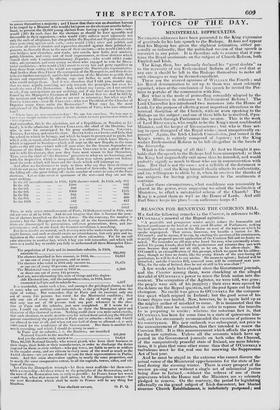TOPICS OP THE DAY.
MINISTERIAL MFFICULTIES.
Ni }mous addresses have been presented to the king expeessive of gratitude for his late speech to the Bishops.. It does not appear
that his Majesty has given the slightest intimation, either per- sonally or indirectly, that the published versim of that speech is incorrect in any point. It is therefore safe to assume that it con- tains the Royal sentiments on the subject of Church Reform, both English and Irish.
The King, then, has solemnly declared his "great doubts.' as to the necessity of any Ecclesiastical Reform at all ; and that at any rate it should be left to the Bishops themselves to make all such changes as may be deemed expedient.
These are the avowed opinions of WILLIAM the Fourth ; and his Royal determination to act up to them was most solemnly signified, when at the conclusion of his speech he invited the Pre- lates to partake of the communion with him.
But what is the mode of proceeding ostensibly adopted by the King's Ministers in reference to Ecclesiastical Reform ? The
Lord Chancellor has introduced two measures into the House of Lords for the purpose of effecting most important alterations in the internal discipline of the Church, without even speaking to the Bishops on the subject ; and one of these bills he is resolved, if pos-
sible, to push through Parliament this session. This is the work of Lord BROUGHAM, who ought to be the King's most confidential
Minister, and the kceper of his conscience; but who is thus act- ing in open disregard of the Royal wishes, most unequivocally ex- pressed. Again, the Irish Church Commission, just issued in the
King's name, is entirely composed of laymen; yet the King wishes Ecclesiastical Reform to be left altogether in the hands of the hierarchy.
What is the meaning of all this? At first we thought it pro- bable that the speech to the Bishops had been misreported; or that the King had unguardedly said more than he intended, and would probably signify as much to those who are in communication with him. But that is not the case : not a syllable of the document is contradicted ; and the King himself clearly admits its authenticity, and his willingness to abide by it, when he receives the thanks of his subjects for having giving utterance to the sentiments it contains.
Under these circumstances, what confidence can reasonably be placed in the power, even supposing we admit the inclination of Ministers, to effect a substantial reform of the Church? The King is a2,ainst them as well as the House of Lords. And still Earl GREY keeps his place !—on sufferance keeps it !






















 Previous page
Previous page